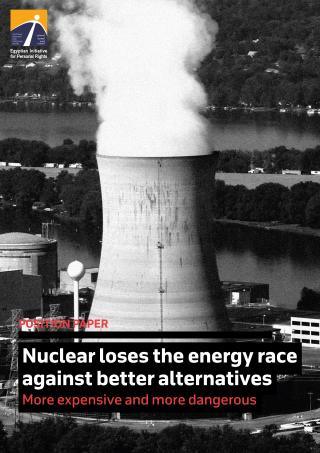Today, the Egyptian Initiative for Personal Rights (EIPR) issued a position paper entitled “An Egyptian emergency plan to confront climate change: COP27 as an opportunity to change course”.
Tags: Climate Changing
Today, EIPR released a research paper entitled "Climate Change and Health in Egypt--Threats and Mitigation Measures". The paper, which is issued within the "Environmental Papers" series, addresses the intersection between public health and environmental policies in Egypt, coinciding with Egypt's hosting of the twenty-seventh session of the Conference of the Parties to the United Nations Climate Agreement (COP27) next month in Sharm El-Sheikh.
Today, the Egyptian Initiative for Personal Rights (EIPR) issued a position paper entitled “An Egyptian emergency plan to confront climate change: COP27 as an opportunity to change course”.
Civil society groups from Egypt, African countries and the Arab world have come together to call for a global mass mobilization of people everywhere to address the root cause of the climate crisis and other injustices, to take place around
The Egyptian Initiative for Personal Rights (EIPR) issued a comment on the report released lately by the Investigation office of the World Bank Group (CAO) on the complaint against the Alexandria Portland Cement Company (Titan Cement Factory), and the International Finance Corporation ( IFC) , the private sector arm of the world bank Group, which funded the establishment of the company.
The study seeks to provide simplified information on various aspects of nuclear power for the sake of facilitating and enriching the public dialogue and participation in the issues of nuclear energy in Egypt. EIPR adopts a position that considers nuclear power an expensive, dangerous, risky and unsustainable source of electricity and that better alternatives exist, especially renewable energy. Renewable resources would guarantee energy security and accessibility while protecting health and environment.
The world can do without nuclear energy altogether, as there are better alternatives to meet energy and electricity needs. Renewables top the list of these alternatives around the world and in Egypt specifically.
EIPR sees this judgment as justice for the complainants and a recognition of their rights to health and environmental safety. The judgment is particularly important because current environmental laws and regulations allow heavy polluting industries such as cement and coal-powered plants to operate in residential areas.
For many years, the residents practiced many forms of peaceful protests against the factory. They wrote petitions, filed complaints, held negotiations with factory officials, talked about their cause in the media, used social media, produced documentary films, and even conducted researches and proposed alternatives.
Residents of Wadi al-Qamar have recently posted a video, dated 18 May 2017, on Facebook, which depicts very large emissions coming out of a chimney of the Alexandria Portland Cement’s plant (APCC), which is adjacent to their homes. APCC is a subsidiary of TITAN Cement Group, a multinational cement and building materials producing company, based in Greece. Residents of the area have been complaining for years about the environmental pollution caused by the plant and the harmful effects it has had on their health and the health of their children.








